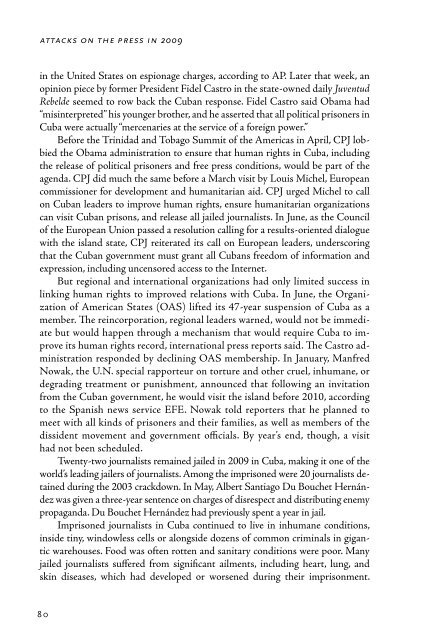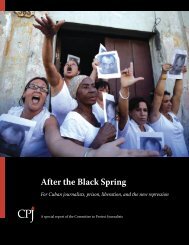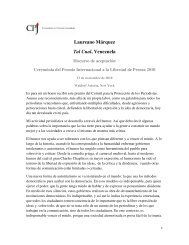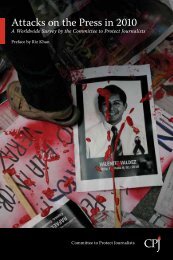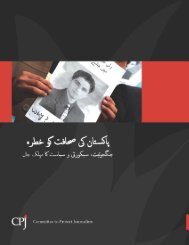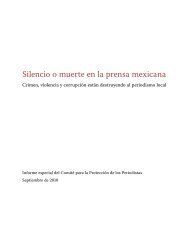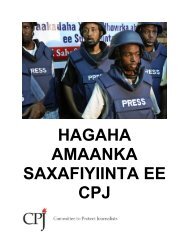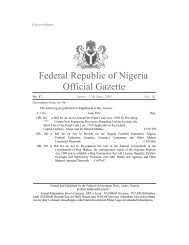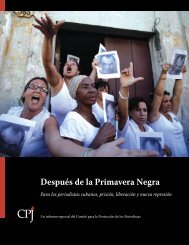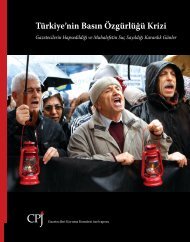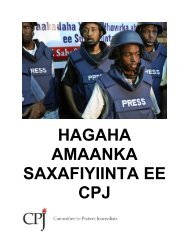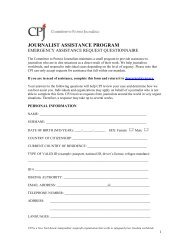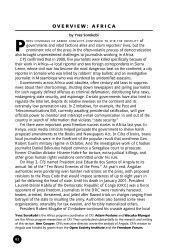Attacks on the Press - Committee to Protect Journalists
Attacks on the Press - Committee to Protect Journalists
Attacks on the Press - Committee to Protect Journalists
- No tags were found...
Create successful ePaper yourself
Turn your PDF publications into a flip-book with our unique Google optimized e-Paper software.
attacks <strong>on</strong> <strong>the</strong> press in 2009americas: cubain <strong>the</strong> United States <strong>on</strong> espi<strong>on</strong>age charges, according <strong>to</strong> AP. Later that week, anopini<strong>on</strong> piece by former President Fidel Castro in <strong>the</strong> state-owned daily JuventudRebelde seemed <strong>to</strong> row back <strong>the</strong> Cuban resp<strong>on</strong>se. Fidel Castro said Obama had“misinterpreted” his younger bro<strong>the</strong>r, and he asserted that all political pris<strong>on</strong>ers inCuba were actually “mercenaries at <strong>the</strong> service of a foreign power.”Before <strong>the</strong> Trinidad and Tobago Summit of <strong>the</strong> Americas in April, CPJ lobbied<strong>the</strong> Obama administrati<strong>on</strong> <strong>to</strong> ensure that human rights in Cuba, including<strong>the</strong> release of political pris<strong>on</strong>ers and free press c<strong>on</strong>diti<strong>on</strong>s, would be part of <strong>the</strong>agenda. CPJ did much <strong>the</strong> same before a March visit by Louis Michel, Europeancommissi<strong>on</strong>er for development and humanitarian aid. CPJ urged Michel <strong>to</strong> call<strong>on</strong> Cuban leaders <strong>to</strong> improve human rights, ensure humanitarian organizati<strong>on</strong>scan visit Cuban pris<strong>on</strong>s, and release all jailed journalists. In June, as <strong>the</strong> Councilof <strong>the</strong> European Uni<strong>on</strong> passed a resoluti<strong>on</strong> calling for a results-oriented dialoguewith <strong>the</strong> island state, CPJ reiterated its call <strong>on</strong> European leaders, underscoringthat <strong>the</strong> Cuban government must grant all Cubans freedom of informati<strong>on</strong> andexpressi<strong>on</strong>, including uncensored access <strong>to</strong> <strong>the</strong> Internet.But regi<strong>on</strong>al and internati<strong>on</strong>al organizati<strong>on</strong>s had <strong>on</strong>ly limited success inlinking human rights <strong>to</strong> improved relati<strong>on</strong>s with Cuba. In June, <strong>the</strong> Organizati<strong>on</strong>of American States (OAS) lifted its 47-year suspensi<strong>on</strong> of Cuba as amember. The reincorporati<strong>on</strong>, regi<strong>on</strong>al leaders warned, would not be immediatebut would happen through a mechanism that would require Cuba <strong>to</strong> improveits human rights record, internati<strong>on</strong>al press reports said. The Castro administrati<strong>on</strong>resp<strong>on</strong>ded by declining OAS membership. In January, ManfredNowak, <strong>the</strong> U.N. special rapporteur <strong>on</strong> <strong>to</strong>rture and o<strong>the</strong>r cruel, inhumane, ordegrading treatment or punishment, announced that following an invitati<strong>on</strong>from <strong>the</strong> Cuban government, he would visit <strong>the</strong> island before 2010, according<strong>to</strong> <strong>the</strong> Spanish news service EFE. Nowak <strong>to</strong>ld reporters that he planned <strong>to</strong>meet with all kinds of pris<strong>on</strong>ers and <strong>the</strong>ir families, as well as members of <strong>the</strong>dissident movement and government officials. By year’s end, though, a visithad not been scheduled.Twenty-two journalists remained jailed in 2009 in Cuba, making it <strong>on</strong>e of <strong>the</strong>world’s leading jailers of journalists. Am<strong>on</strong>g <strong>the</strong> impris<strong>on</strong>ed were 20 journalists detainedduring <strong>the</strong> 2003 crackdown. In May, Albert Santiago Du Bouchet Hernándezwas given a three-year sentence <strong>on</strong> charges of disrespect and distributing enemypropaganda. Du Bouchet Hernández had previously spent a year in jail.Impris<strong>on</strong>ed journalists in Cuba c<strong>on</strong>tinued <strong>to</strong> live in inhumane c<strong>on</strong>diti<strong>on</strong>s,inside tiny, windowless cells or al<strong>on</strong>gside dozens of comm<strong>on</strong> criminals in giganticwarehouses. Food was often rotten and sanitary c<strong>on</strong>diti<strong>on</strong>s were poor. Manyjailed journalists suffered from significant ailments, including heart, lung, andskin diseases, which had developed or worsened during <strong>the</strong>ir impris<strong>on</strong>ment.CPJ research found that at least 10 had engaged in lengthy and dangerous hungerstrikes in 2009 <strong>to</strong> protest <strong>the</strong> poor c<strong>on</strong>diti<strong>on</strong>s of <strong>the</strong>ir impris<strong>on</strong>ment. Manysought greater access <strong>to</strong> priests and doc<strong>to</strong>rs, al<strong>on</strong>g with better food.Am<strong>on</strong>g <strong>the</strong> reporters who remained behind bars was Héc<strong>to</strong>r Maseda Gutiérrez,who in 2008 was awarded CPJ’s Internati<strong>on</strong>al <strong>Press</strong> Freedom Award. MasedaGutiérrez, 66, a founding member of <strong>the</strong> independent news agency Grupo deTrabajo Decoro, was arrested during <strong>the</strong> sec<strong>on</strong>d day of <strong>the</strong> massive governmentcrackdown in 2003. Despite several appeals from his family <strong>to</strong> Cuban authorities,<strong>the</strong> journalist was being held at <strong>the</strong> maximum security Agüica Pris<strong>on</strong> in westernMatanzas province without medical attenti<strong>on</strong> for high blood pressure and aworsening skin c<strong>on</strong>diti<strong>on</strong>, his wife, Laura Pollán Toledo, said. Maseda Gutiérrezc<strong>on</strong>tinued <strong>to</strong> smuggle reports from pris<strong>on</strong> describing poor c<strong>on</strong>diti<strong>on</strong>s and humanrights violati<strong>on</strong>s.Outside pris<strong>on</strong> walls, journalists’ families c<strong>on</strong>tinued <strong>to</strong> be harassed. In August,72-year-old Graciela G<strong>on</strong>zález-Degard, whose bro<strong>the</strong>r, Ricardo G<strong>on</strong>zálezAlf<strong>on</strong>so, was being held at Havana’s Combinado del Este Pris<strong>on</strong>, described <strong>to</strong>CPJ a two-week trip <strong>to</strong> Cuba. G<strong>on</strong>zález-Degard said state security agents questi<strong>on</strong>edand threatened her, while pris<strong>on</strong> authorities denied her planned visits andrebuffed family requests <strong>to</strong> provide <strong>the</strong> journalist with clean clo<strong>the</strong>s. She saidCuban authorities had blacklisted her bro<strong>the</strong>r’s wife and two teenage s<strong>on</strong>s fromworking, and routinely revoked G<strong>on</strong>zález Alf<strong>on</strong>so’s privileges as punishment forhis protests. O<strong>the</strong>r families whose members are vocal human rights activists <strong>to</strong>ldCPJ that secret police agents follow <strong>the</strong>m, tap <strong>the</strong>ir ph<strong>on</strong>es, and hack in<strong>to</strong> <strong>the</strong>ire-mail accounts.Independent journalists reporting from <strong>the</strong> streets were similarly targetedby local authorities. State security officers repeatedly detained and questi<strong>on</strong>edRober<strong>to</strong> de Jesús Guerra Perez, direc<strong>to</strong>r of <strong>the</strong> Havana-based Hablemos <strong>Press</strong>.After a four-day detenti<strong>on</strong> in March, Guerra Perez <strong>to</strong>ld CPJ that he had beenc<strong>on</strong>tinuously and aggressively threatened before being released. His wife, IsmariSalomón Carcases, said her husband had been detained at least 50 timesin 2008.O<strong>the</strong>r independent reporters in Havana and <strong>the</strong> provinces were briefly detainedduring <strong>the</strong> year. In May, state security agents warned independent journalistJulio Beltrán that if he c<strong>on</strong>tinued writing, he would be impris<strong>on</strong>ed, <strong>the</strong>Miami-based news Web site Cubanet reported. A m<strong>on</strong>th earlier, Yudelmis F<strong>on</strong>seca,a 25-year-old reporter in Havana for <strong>the</strong> independent news agency Centrode Información de Derechos Humanos de Cuba, was fired from her state jobwithout explanati<strong>on</strong>, Cubanet reported. F<strong>on</strong>seca said she had previously been detainedseveral times.N<strong>on</strong>e<strong>the</strong>less, like <strong>the</strong> young independent blogging community, o<strong>the</strong>r Cubans8 08 1


